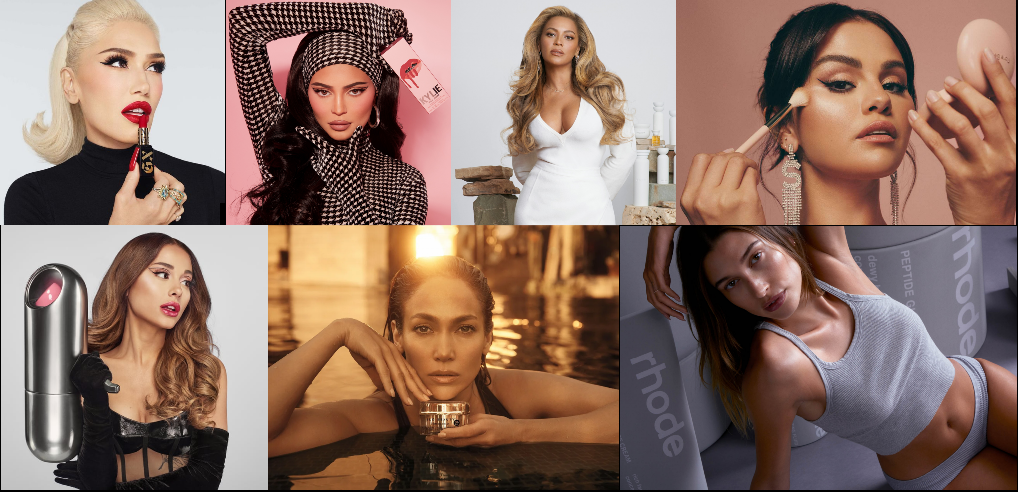

Star power is one thing, but we must remember that your brand is your power.
So how can star power be channeled into brand power? Let’s take a deep dive into 7 beauty brands built by celebrities and decode brand naming and packaging design strategies prevalent in the celebrity brand space.
Kylie Cosmetics and JLo Beauty
One of the main strategies in the celebrity brand space is to maximize the association between the brand and the celebrity. Celebrities taking this approach often name their brands with their own names and take center stage fronting the brand image and value proposition. Brands exemplifying this strategy include Kylie Cosmetics and JLo Beauty where their famous founders—Kylie Jenner and Jennifer Lopez, respectively—take center stage, their names emblazoned in bold across packaging.
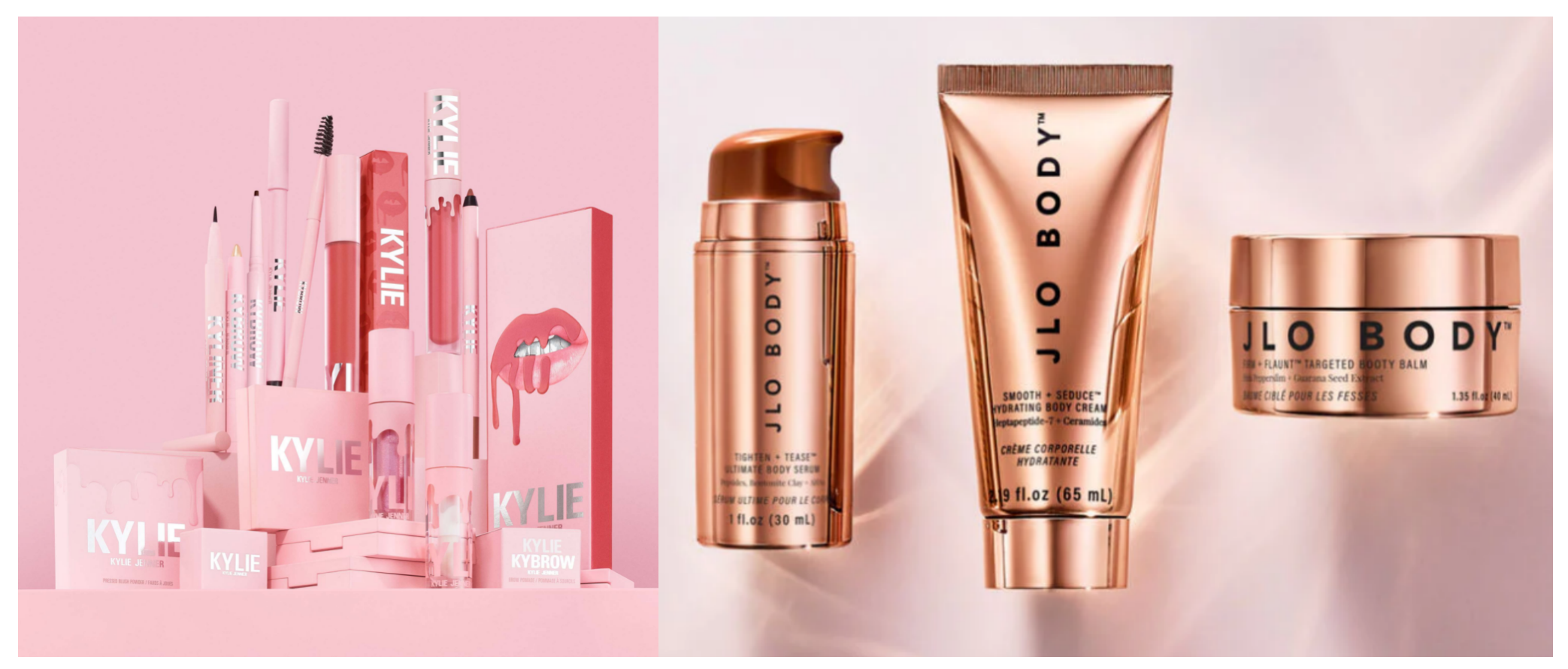
In the synonymous strategy, the value proposition is usually inherent and simple: buy the product to be more like said celebrity. Kylie Cosmetics epitomizes this ethos, with Jenner asserting that she “created kylie cosmetics [sic] to give my fans access to the makeup products that i love and use every single day to create my looks.” Her packaging reinforces this proposition with KYLIE written conspicuously in bold caps across most SKUs. JLo Beauty follows suit, with “JLO” brandished prominently. The reflective golden packaging of JLo Beauty works to reinforce the warm radiance of Lopez’s image while the dripping lips featured on Kylie Cosmetics “lip kits” harken back to Jenner’s famous pout. Both celebs utilize this approach to brand naming and packaging to make their brands nearly synonymous with their name and image.
Yet, beneath the surface allure lies a paradox: while the immediate cachet of celebrity association may catapult these brands, the synonymous strategy also comes with risks in the long term. The value of these brands rests on the aspirational lens through which consumers view these celebrities at a given time. As such, these brands have little wiggle room to evolve outside of the star’s reputation and are high-risk from a PR perspective as the celebrity’s public perception fluctuates. A brand that is nearly synonymous with its celebrity founder may benefit from some initial trust—“I knew that when we launched, it had to be amazing because it has my name on it” claims Lopez on JLo Beauty’s website. However, if and when the public’s trust is shaken, these brands can easily be seen as a vanity project or cash grab.
Rhode, r.e.m. beauty and GXVE
Another common strategy among celebrity beauty brands is to establish a looser, but still palpable, connection to the star by building a brand that is not solely emblematic of the star, but with an aesthetic that the star is known for.
Hailey Bieber’s skincare venture, Rhode, stands as a striking embodiment of strategic brand evolution. Based on Hailey’s reputation for the “clean girl” aesthetic, which she strategically built up on social media before the brand’s launch, Rhode is a notable example of the style reputation strategy. Initially, Hailey pursued the synonymous strategy by seeking a trademark for “Bieber Beauty” in 2019, but she changed course when the name faced rejection due to prior trademark filings by her husband, Justin Bieber. Luckily, she avoided the potential risks of the synonymous strategy, which can be particularly precarious when leveraging a married name—Kim Kardashian’s KKW Beauty can serve as a cautionary tale as she had to rebrand after her divorce from Kanye West.
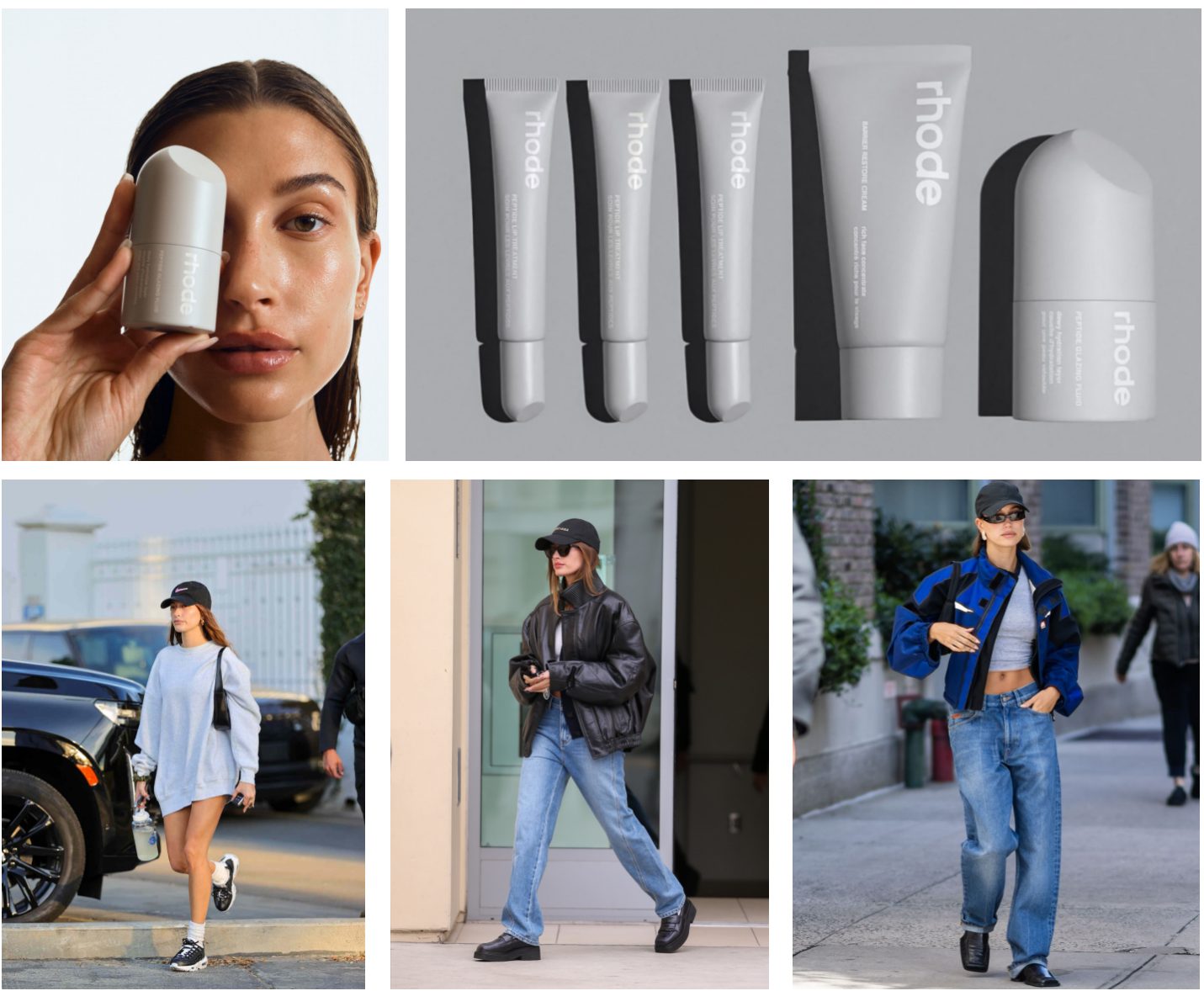
Instead, Hailey pivoted to her middle name, Rhode, which evokes a minimalist simplicity echoing the brand vision of simplified skincare philosophy. Embracing a palette of subdued greys, Rhode’s packaging is toned down and understated, reinforcing the brand’s cohesive message through thoughtful design choices. The utilitarian packaging with a hint of sportiness is emblematic of Hailey’s signature “model off duty” style and supports the brand promise by signaling an intentional focus on ingredients rather than packaging.
In the case of Rhode, the name and packaging still benefit from the star’s reputation, albeit with less immediate associations compared to the synonymous approach. However, these touchpoints also underscore Rhode’s brand values independent of Hailey, offering greater flexibility for the brand’s long-term growth.
Ariana Grande’s beauty brand r.e.m. beauty is another example of the style reputation strategy, based on a vintage-mod, sci-fi space theme that the artist has played with in some of her songs and music videos. The dreamy sci-fi celestial thematics underscore her brand as a popstar—songs such as “NASA” and the music videos for “Break Free” and “34+35” are prime examples. Her personal style and makeup looks also tend to take cues from 60s-Mod fashion, further solidifying r.e.m. beauty as a natural extension of Grande’s personal style.

The packaging of her makeup seems to come from fantasy worlds conveyed in her music videos—space-grey with bulbed windows reminiscent of spacesuits and galaxy-esque designs in pressed powders. The brand is named after her song “R.E.M,” adding a dreamy sonic element to reinforce the brand universe. Furthermore, the official brand name is presented in lowercase letters, reflecting Grande’s penchant for a ‘not-too-serious’ naming approach evident in many of her song titles and album titles. It also serves as a poignant symbol of the brand’s vision, referencing the rapid eye movement experienced during deep sleep when people dream, reinforcing the idea that the brand’s makeup facilitates any makeup look the user dreams of.
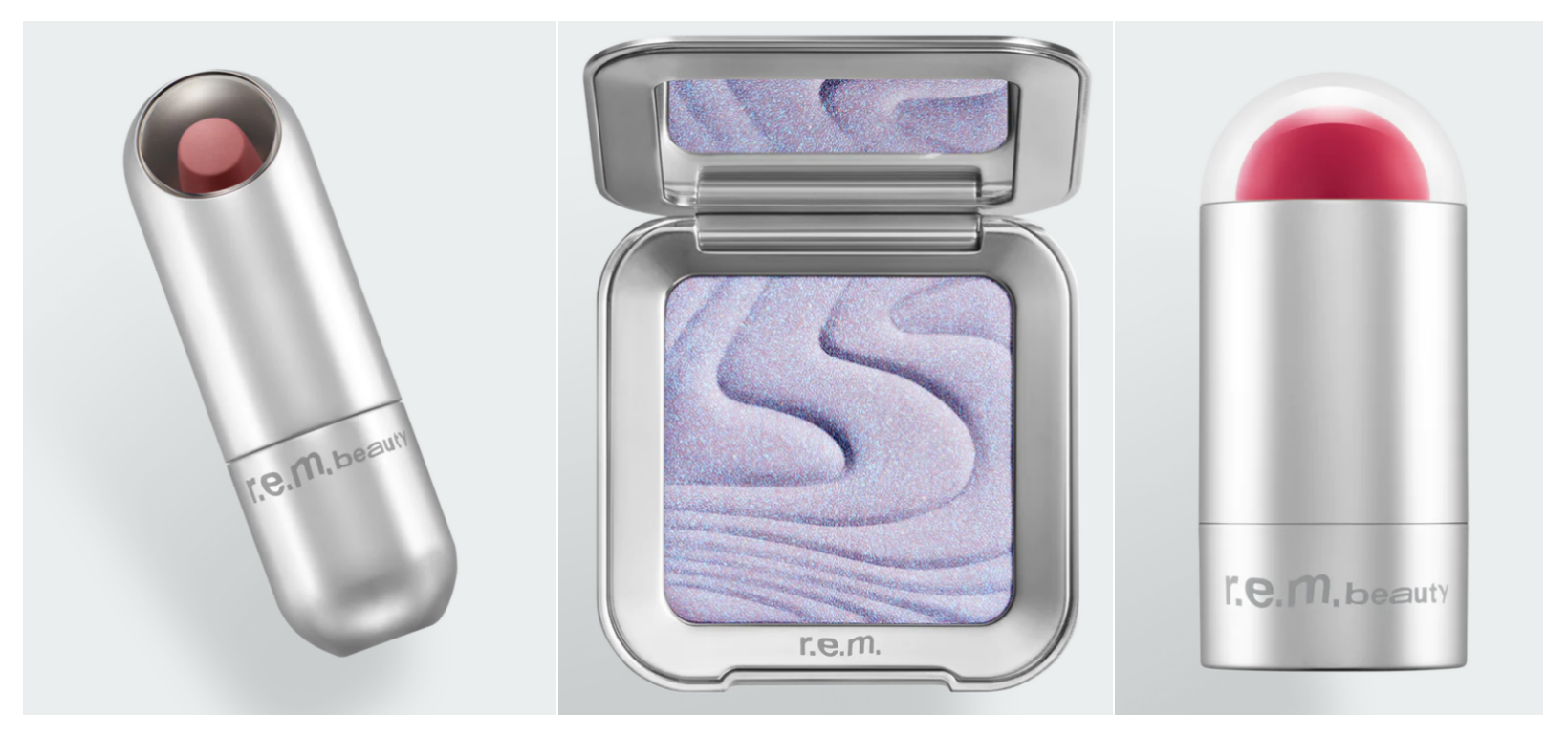

Gwen Stefani’s beauty brand, GXVE (pronounced “give”), reflects Stefani’s signature style, offering a range of products that pay homage to the singer’s signature glam-punk style— red lips, wing-shaped eyeliner, and bold eyebrows.

The name “GXVE” reflects Gwen’s unique signature, incorporating her iconic “G” and “x” as a kiss, symbolizing her personal touch and alternative approach. Likewise, the packaging echoes Stefani’s style reputation and utilizes a daring punk rock color palette of black, white, and gold as well as rebel-coded design elements such as checkered patterns, bandana prints, and gothic fonts. This bold rockstar aesthetic interestingly crosses over with design choices that convey transparency—at times, with clear packaging or exposed organic materials. The culmination of these packaging design elements helps convey the brand’s ethos that clean makeup doesn’t have to compromise on bold impact.
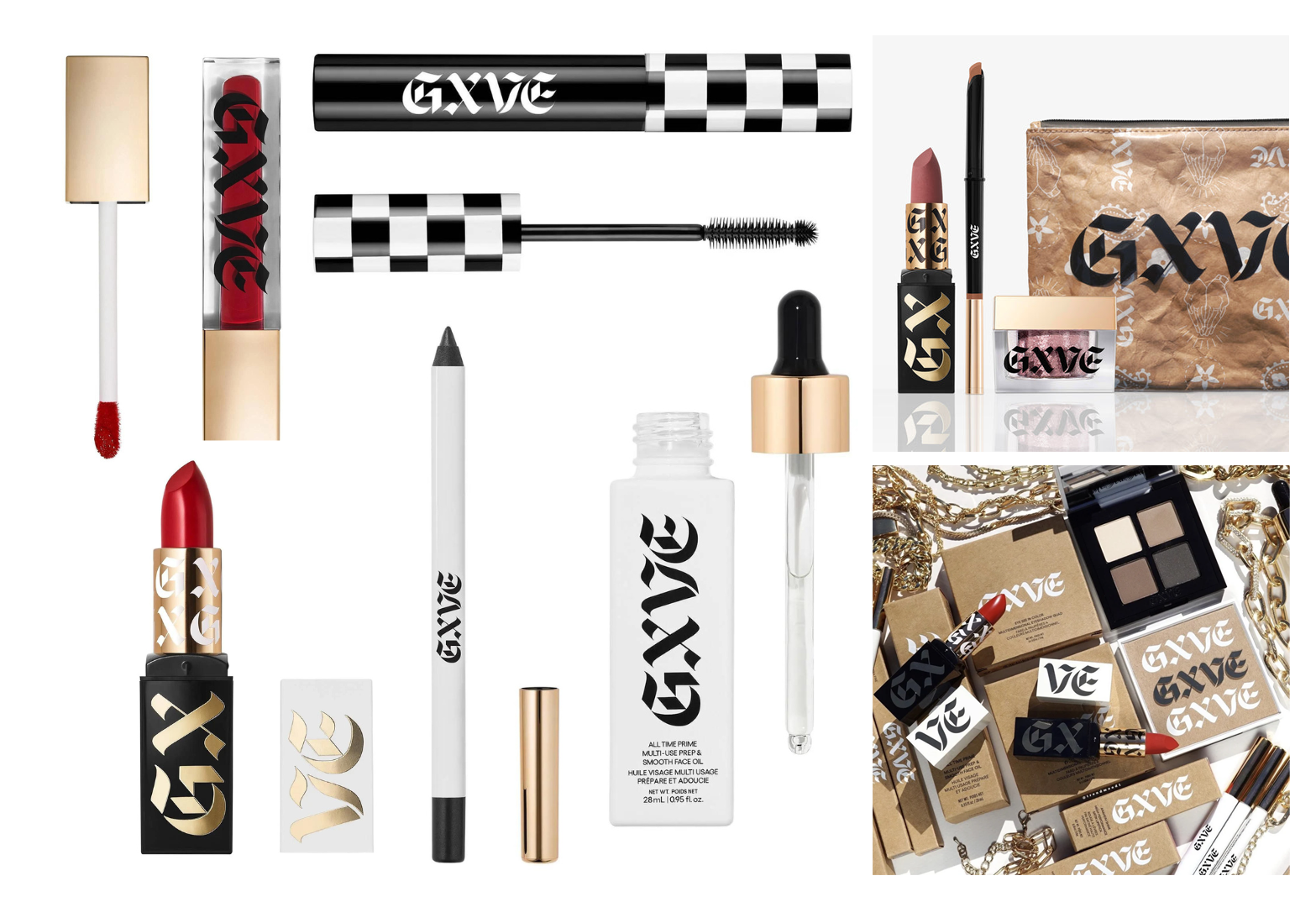
Rare Beauty and Cécred
Some celebrity beauty brands draw less from the star’s personal style and more from the beliefs they advocate for.
Unlike other celebrity brands that offer fans an opportunity to emulate the star’s appearance, Rare Beauty takes the opposite approach: “Rare Beauty is not about being someone else, but being who you are.”
Selena Gomez is widely known for her unwavering honesty regarding her mental health journey, fostering a strong connection with her fans by emphasizing the importance of mental health education. Through Rare Beauty, she seeks to underscore the idea that nurturing a healthy mind holds greater importance than outward appearance.
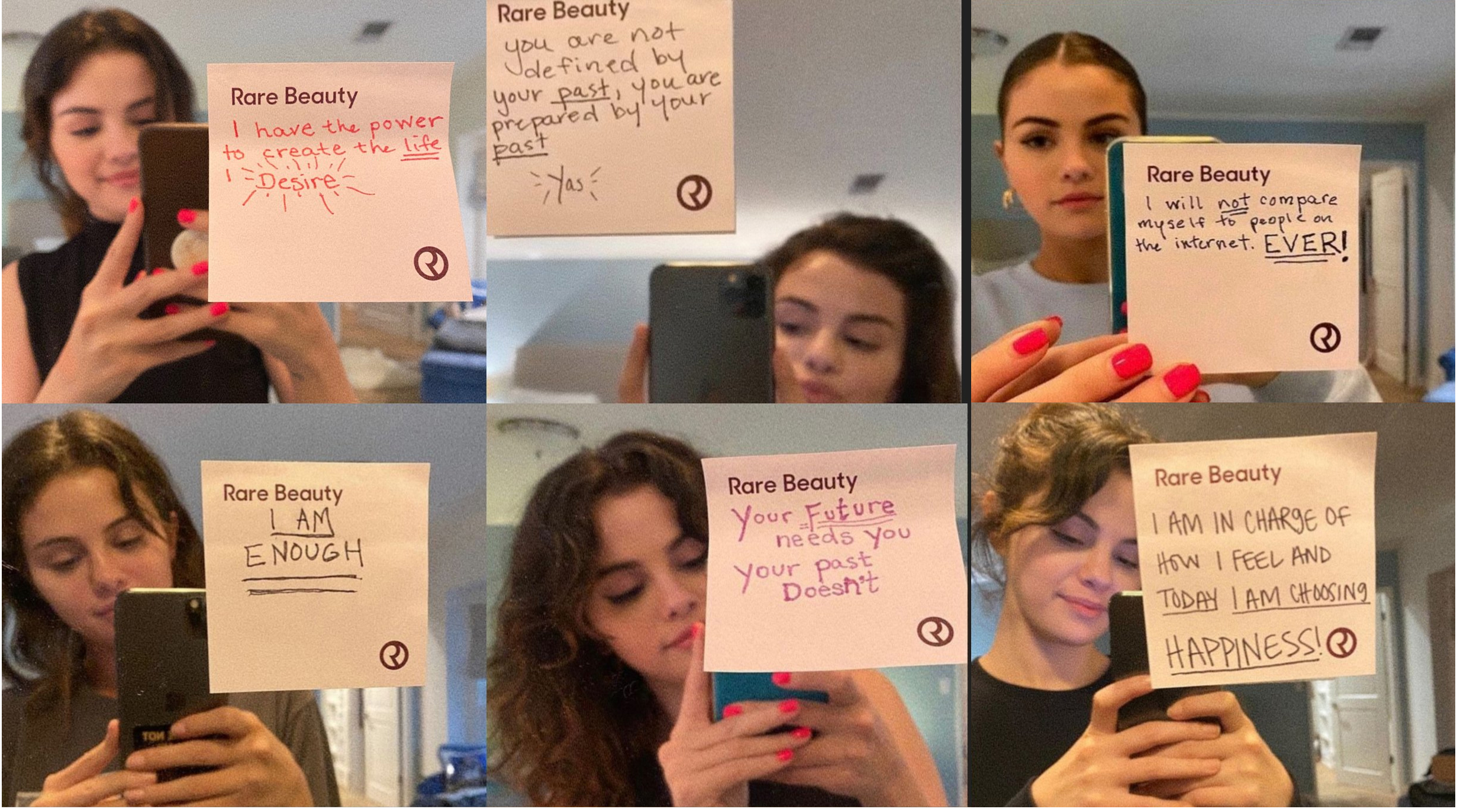
The brand’s choices follow this purpose-driven throughline, starting with the name, Rare. The name itself symbolizes the brand’s mission to help everyone celebrate their individuality. The brand frequently features uplifting messages like “You are Rare” inside the shipment boxes, emphasizing its commitment to promoting self-love.
Likewise, Rare Beauty’s packaging design places a strong emphasis on inclusivity, with features tailored to accommodate individuals with dexterity issues. This thoughtful approach ensures that even those with limited hand and arm mobility can fully engage in the beauty community. From packaging finishes that offer a secure grip to bottle sizes designed for easier handling, and lipstick tubes crafted for one-handed opening, every detail has been carefully considered to enhance accessibility. These small but significant adjustments exemplify Rare Beauty’s dedication to inclusivity and empowerment.
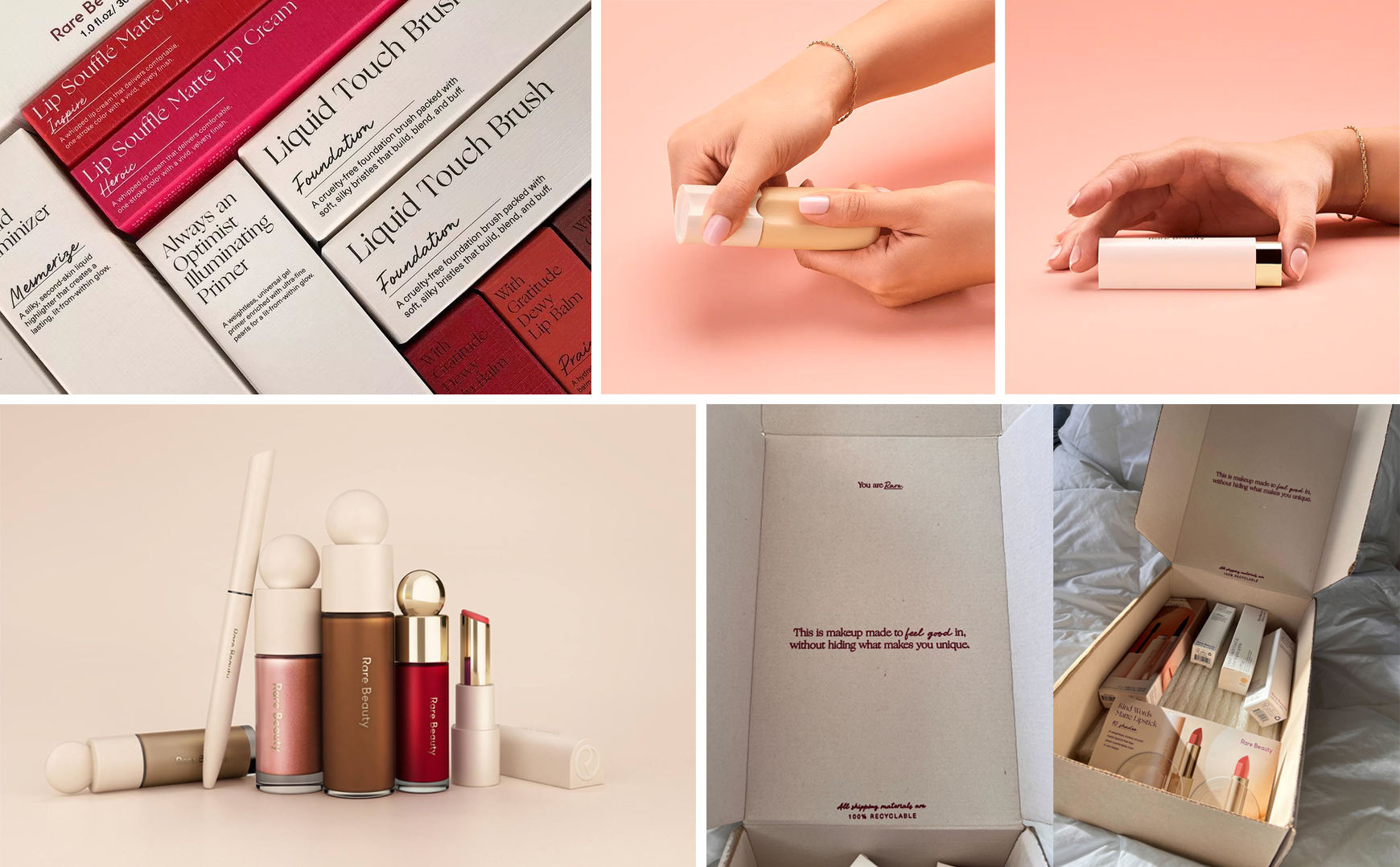
Beyoncé’s recently launched haircare brand, Cécred (pronounced “sacred”), takes the personal values approach. Beyonce is known for her hair that flows angelically when fanned out at her performances, but this association is not what defines her haircare brand. Before ascending to her throne as Queen Bey, Beyoncé dedicated her formative years to assisting her mother, Tina Knowles, in their family-owned salon in Houston. Through Cécred, Beyoncé aims to channel the wisdom imparted by her mother. The brand strives to make the haircare category more inclusive by prioritizing the needs of textured hair with products that take inspiration from hair rituals across global cultures.
“As a Black founder, it was important to me to concentrate on where I saw the greatest need for healthy haircare” Beyoncé explained in a statement following the launch.
The packaging design reinforces the idea of haircare as a sacred ritual. Cécred’s luxuriously elegant bottles and jars are decorated with a custom pebbled surface that’s meant to mimic the stone of ancient monuments. Textured surfaces and unique cap shapes help cement products in the context of ritualistic usage.
While the brand name is called out as hard to pronounce by some, it’s still clever in many ways. Cécred incorporates the last letters of Beyoncé’s name, complete with the iconic accent aigu, which subtly pays homage while also aiding more intuitive pronunciation and creating a unique word that facilitates a brand universe. Cécred also serves as a poignant reflection of the brand’s ethos, deeply rooted in the rich traditions of haircare rituals that, according to the brand vision, are sacred. This connection holds particular significance, resonating with the cultural heritage prevalent in the realm of haircare, especially within African traditions. The name captures the soul and vision of the brand, the things that will help ensure long-term success.
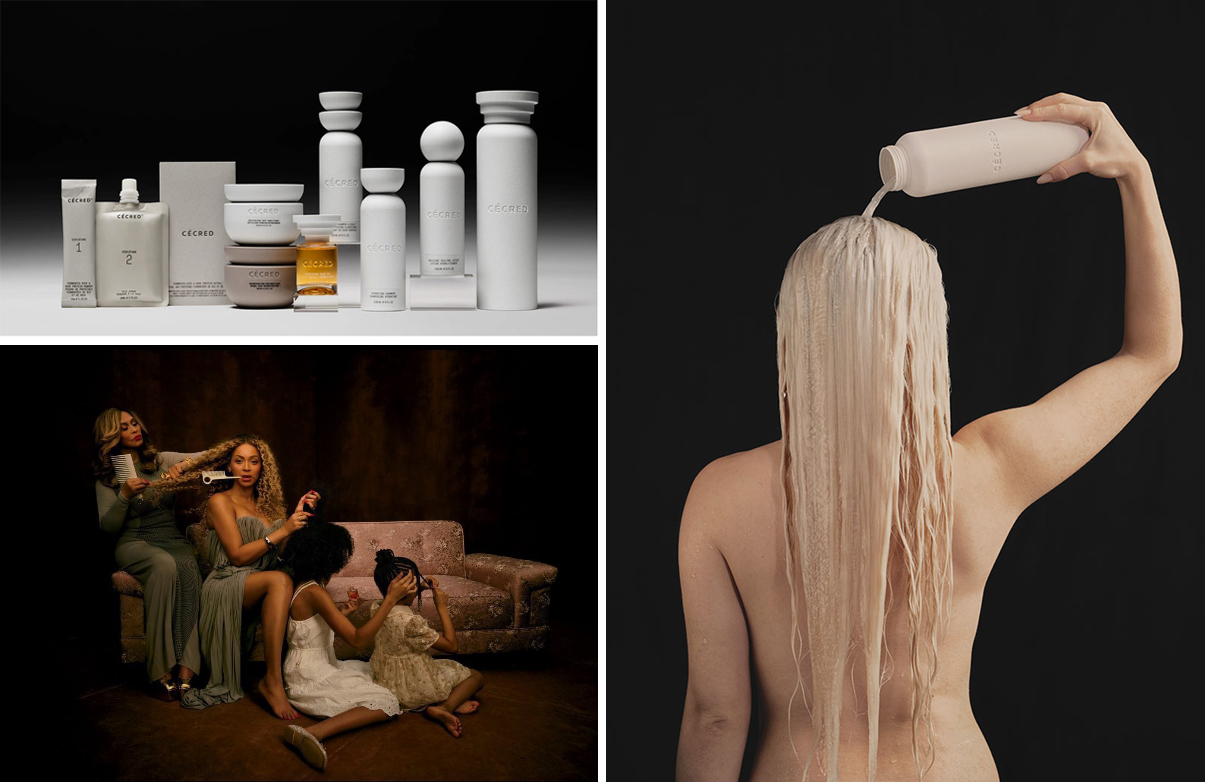
In an era where celebrities increasingly embark on entrepreneurial ventures, particularly in the realms of cosmetics, skincare, and haircare, it’s evident that star power can be harnessed to drive brand recognition and loyalty.
As we’ve explored various celebrity brand strategies, from the synonymous approach epitomized by brands like KylieCosmetics and JLo Beauty to the style reputation tactics of GXVE, r.e.m. beauty, and Rhode, it’s clear that each approach carries its own set of opportunities and risks. The synonymous strategy may offer instant recognition and trust, but it also leaves little room for brand evolution and can falter if the celebrity’s reputation faces scrutiny. On the other hand, the style reputation strategy allows for a looser connection to the star while reinforcing brand values, providing greater flexibility for long-term growth.
Moreover, some celebrity brands transcend mere aesthetics, embodying personal values and advocacy. Rare Beauty, founded by Selena Gomez, prioritizes mental health and inclusivity, fostering a community built on self-love and acceptance. Similarly, Beyoncé’s Cécred embraces the sacred rituals of haircare, championing inclusivity and cultural heritage. These brands get through to consumers on a deeper level and tend to have the best prospects for independent growth.
As we navigate the landscape of celebrity beauty brands, it becomes evident that while star power may ignite initial interest, it’s the authenticity, innovation, and alignment with consumer values that ultimately determine a brand’s success. In an industry driven by constant evolution and changing trends, the brands that endure are those that can adapt, resonate, and inspire beyond the allure of celebrity.
Sarah Bourek
Insights & Strategy Consultant, US
A Labbrand Group Company © 2005-2024 Labbrand All rights reserved
沪ICP备17001253号-3* Will be used in accordance with our Privacy Policy
To improve your experience, we use cookies to provide social media features, offer you content that targets your particular interests, and analyse the performance of our advertising campaigns. By clicking on “Accept” you consent to all cookies. You also have the option to click “Reject” to limit the use of certain types of cookies. Please be aware that rejecting cookies may affect your website browsing experience and limit the use of some personalised features.